#that’s character development
Text
Spencer went from failing/ barely passing his gun qualifications to getting a perfect score. 🥺🥺 Hotch would be so proud.
20 notes
·
View notes
Text
Convinced that a great part of season 12 is Crowley trying to woobify himself to Cas.
#he’s speaking less innuendo and more in the language of incessant whining and constant singing#that’s character development#crowley squeaks in season 11 and 12#and that’s so adorable of him#crowley wants friends soooo badly#and rowena effortlessly gets sam and cas on her side how frustrating#rowena is uncool but she’s definitely cooler than crowley oof#how tragic for him#spn + class#rowena & crowley
4 notes
·
View notes
Text
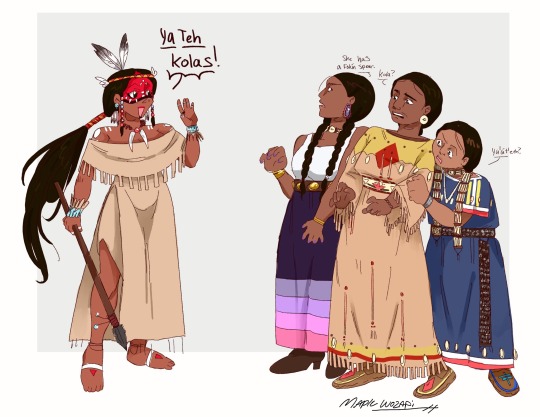
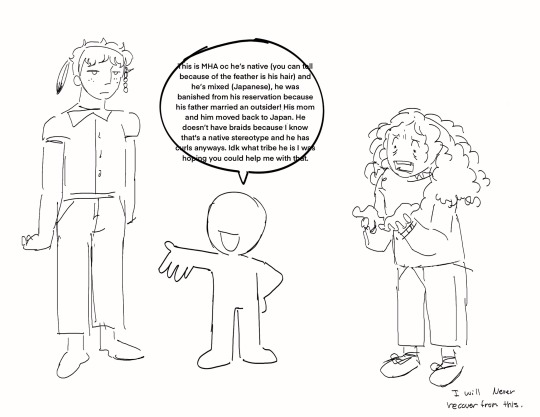
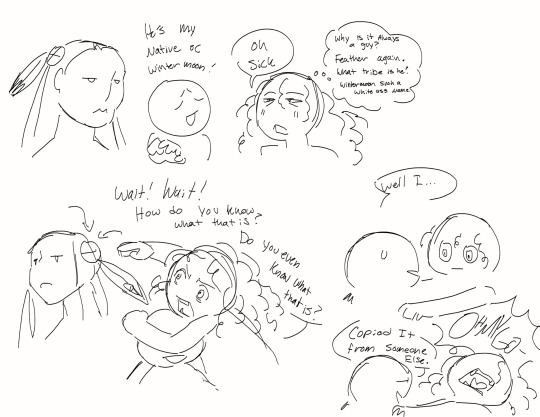
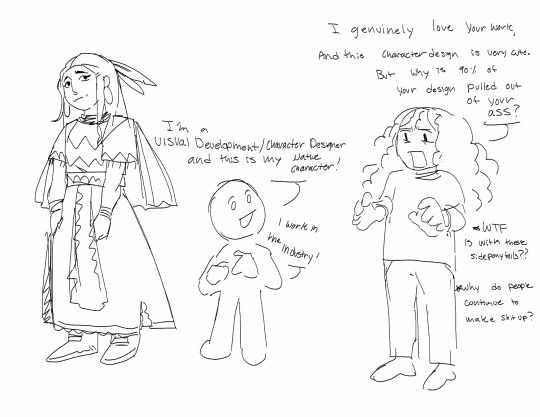
I genuinely feel like I’m going insane sometimes
#native artist#character design#digital art#indigenous artist#visual development#character art#oringinal character
59K notes
·
View notes
Text
20 Compelling Positive-Negative Trait Pairs
Here are 20 positive and negative trait pairs that can create compelling character dynamics in storytelling:
1. Bravery - Recklessness:
A character is courageous in the face of danger but often takes unnecessary risks.
2. Intelligence - Arrogance:
A character is exceptionally smart but looks down on others.
3. Compassion - Naivety:
A character is deeply caring but easily deceived due to their trusting nature.
4. Determination - Stubbornness:
A character is persistent in their goals but unwilling to adapt or compromise.
5. Charisma - Manipulativeness:
A character is charming and persuasive but often uses these traits to exploit others.
6. Resourcefulness - Opportunism:
A character is adept at finding solutions but is also quick to exploit situations for personal gain.
7. Loyalty - Blind Obedience:
A character is fiercely loyal but follows orders without question, even when they're wrong.
8. Optimism - Denial:
A character remains hopeful in difficult times but often ignores harsh realities.
9. Humor - Inappropriateness:
A character lightens the mood with jokes but often crosses the line with their humor.
10. Generosity - Lack of Boundaries:
A character is giving and selfless but often neglects their own needs and well-being.
11. Patience - Passivity:
A character is calm and tolerant but sometimes fails to take action when needed.
12. Wisdom - Cynicism:
A character has deep understanding and insight but is often pessimistic about the world.
13. Confidence - Overconfidence:
A character believes in their abilities but sometimes underestimates challenges.
14. Honesty - Bluntness:
A character is truthful and straightforward but often insensitive in their delivery.
15. Self-discipline - Rigidity:
A character maintains strong control over their actions but is inflexible and resistant to change.
16. Adventurousness - Impulsiveness:
A character loves exploring and trying new things but often acts without thinking.
17. Empathy - Overwhelm:
A character deeply understands and feels others' emotions but can become overwhelmed by them.
18. Ambition - Ruthlessness:
A character is driven to achieve great things but willing to do anything, even unethical, to succeed.
19. Resilience - Emotional Detachment:
A character can endure hardships without breaking but often seems emotionally distant.
20. Strategic - Calculative:
A character excels at planning and foresight but can be cold and overly pragmatic in their decisions.
These pairs create complex, multi-dimensional characters that can drive rich, dynamic storytelling.
---
+ If you find my content valuable, consider Support This Blog on Patreon!
#writing tips#writing advice#character development#writers on tumblr#writeblr#creative writing#fiction writing#writerscommunity#writing#writing help#writing resources#ai assisted
12K notes
·
View notes
Text
Soft Gestures for Comfort
Bringing them a blanket when they’re curled up on the couch.
Whispering, "It’s okay, I’m here," when they wake up from a bad dream.
Stroking their hair gently when they’re lying on your lap.
Running a warm bath for them after a tough day.
Holding them close and saying, "I’ve got you," when they’re upset.
Preparing their favorite comfort food when they’re feeling low.
Turning off their alarm and letting them sleep in when they’re exhausted.
Reading their favorite book to them before bed.
Playing their favorite soothing music to help them relax.
Just sitting in silence with them, letting them know your presence is their safe space.
#writing#writer on tumblr#writerscommunity#writing tips#character development#oc character#writing advice#writing help#writer tumblr#writblr#writing ideas#romantic gestures
9K notes
·
View notes
Text
Writing Tips Master Post
Character writing/development:
Character Arcs
Making Character Profiles
Character Development
Comic Relief Arc
Internal Conflict
Character Voices
Creating Distinct Characters
Suicidal Urges/Martyr Complex
Creating Likeable Characters
Writing Strong Female Characters
Writing POC Characters
Building Tension
Plot devices/development:
Intrigue in Storytelling
Enemies to Lovers
Alternatives to Killing Characters
Worldbuilding
Misdirection
Consider Before Killing Characters
Foreshadowing
Narrative:
Emphasising the Stakes
Avoid Info-Dumping
Writing Without Dialogue
1st vs. 2nd vs. 3rd Perspective
Fight Scenes (+ More)
Transitions
Pacing
Writing Prologues
Dialogue Tips
Writing War
Writing Cheating
Worldbuilding:
Worldbuilding: Questions to Consider
Creating Laws/Rules in Fantasy Worlds
Book writing:
Connected vs. Stand-Alone Series
A & B Stories
Writer resources:
Writing YouTube Channels, Podcasts, & Blogs
Online Writing Resources
Outlining/Writing/Editing Software
Writer help:
Losing Passion/Burnout
Overcoming Writer's Block
Fantasy terms:
How To Name Fantasy Races (Step-by-Step)
Naming Elemental Races
Naming Fire-Related Races
How To Name Fantasy Places
Ask games:
Character Ask Game #1
Character Ask Game #2
Character Ask Game #3
Miscellaneous:
1000 Follower Post
2000 Follower Poll
Writing Fantasy
#masterlist#masterpost#writeblr#writing#writing tips#writing advice#writing help#writing resources#author resources#writer resources#creative writing#character writing#character development#plot development#narrative#book writing#writers block#writer stuff#writer things#fantasy writing#writer ask game#deception-united
18K notes
·
View notes
Text
ultimate character development template
basics
name:
meaning of name:
nicknames/titles:
age:
gender:
location:
birthday:
strengths + example where it's shown:
weaknesses + example where it's shown:
how it affects others:
emotional depth
attachment style + how it manifests in the story:
physical fear:
emotional/abstract fear:
happy memory:
sad memory:
object of significance:
philosophical outlook/belief:
what characters are ignorant about themselves:
how confident are they:
goal:
long-term dreams:
what they're embarrassed/ashamed to tell others about:
regrets:
source of pride:
source of misery:
what they admire above all else:
do they believe in fate:
personality
mbti:
enneagram:
big five:
character archetype:
star sign:
who they pretend to be on the outside:
who they actually are/how they feel towards the mask:
mental health conditions:
how it manifests for them:
iq:
eq:
humour:
reputation:
habits
bad habits:
mannerisms when stressed:
mannerisms when content:
mannerisms when scared:
mannerisms normally:
verbal mannerisms/distinctive speaking style:
how do they move across a room:
what do they say and what remains unsaid:
how they express love:
hobbies:
appearance
defining features:
eye shape + colour:
hair texture + colour:
skin texture + tone:
vibe:
height:
build:
clothing:
any bodily disfigurement (scars, etc.):
overall attractiveness:
their opinion on their appearance:
appeals to:
relationships
who they trust most:
what they wish they could do for them:
what's holding them back:
who they hate most:
what they wish they could do to them:
what's holding them back:
relationship with the protagonist:
relationship with the antagonist:
siblings:
relationship with them:
parents/step-parents:
relationship with them:
previous broken relationships:
why did it break:
what others expect of them:
who believes in them:
their mentor character/who they look up to:
political/religious/other affiliations:
what makes them different from every other character:
non-human relationships + why:
romantic "type" + why:
relationship dynamics:
backstory/background
primary emotion towards their past:
primary feelings while in their past:
where did they grow up:
defining incidents:
earliest childhood memory:
saddest memory:
happiest memory:
major accomplishments:
their opinion on it:
notable people in their backstory:
effect on them today:
trauma:
what have they already lost:
financial circumstance:
progression
why are they important (eg. why're they the only one able to do something?):
what do they learn about themselves throughout the story:
what do they learn about the world:
how do they feel towards their newfound knowledge:
character arc (positive, negative, neutral):
how relationships change because of their actions:
what mistakes do they make:
what scene is their character highlighted:
do they get what they want:
why or why not:
what happens to them after the story ends:
#character development#creative writing#writeblr#writing ideas#writing#writblr#character design#character description#character template#writing help#writing advice#character sheet#writerscommunity#writers on tumblr#writers and poets#writer stuff#ao3 writer
6K notes
·
View notes
Text
oc asks: not-so-nice edition
alone: How does your OC deal with loneliness? Have they ever been completely alone before? How do they act when there's no one around to see them?
betrayal: Has your OC ever been betrayed by someone they thought they could trust? Has your OC ever betrayed someone who trusted them?
bound: Has your OC ever been imprisoned or captured? What happened? How did they get out? Did the experience leave any scars?
break: What would cause your OC to break down completely? What do they look like when that happens? Has anyone ever seen them at their lowest?
desire: What's one thing your OC wants more than anything in the world? Are they open with that desire? Why or why not? What would they do to fulfill it?
failure: What's your OC's greatest failure? Have they been able to move past it? Does anyone else know about it?
fear: What is your OC's greatest fear? What do they do when confronted with it? Are they open with their fear, or do they hide it away?
future: What's the worst possible future for your OC? Are they taking steps to avoid that outcome? Are they even aware it's a possibility?
ghost: Who or what haunts your OC? What happened? How do they live with their ghosts?
guilt: What is your OC guilty about? How do they handle their guilt? Do they try to avoid guilt, or do they accept it?
hate: What does your OC hate? Why? How do they act towards the object of their hatred?
heartbreak: Have they ever had a relationship that ended badly? Experienced some other kind of heartbreak? What happened?
hide: What does your OC hide? Why do they hide it?
hunt: Who or what is your OC hunted by? A person, a feeling, a past mistake? Is your OC able to let their guard down, or are they constantly alert?
mask: Does your OC wear a mask, literally or figuratively? What goes on beneath it? Is there anyone in their life who gets to see who they are under the mask?
midnight: What keeps your OC up at night? Do they have nightmares? Fears? Anxieties? What do they do in the small hours of the morning when they should be sleeping?
mistake: What's the worst mistake your OC ever made? What led to them making it? Have they been able to fix it? How have they moved on?
monster: Is your OC monstrous in any way? Is there something that makes them monstrous? Are they aware of their own monstrosity? Do they accept it or reject it?
nightmare: What does your OC have nightmares about? How do they deal with their nightmares? Do they tell people, or keep it to themself?
pain: What's the worst pain your OC has ever felt? Do they have a high pain tolerance?
secret: What's one secret your OC never wants anyone to know about them?
skin: How comfortable is your OC in their skin? Do they grapple with anything that lives inside them—a beast, a curse, a failure, a monster? How do they face the smallest, weakest, most horrible version of themself? Are they able to acknowledge it at all?
torture: Has your OC ever been tortured? Would your OC ever torture someone else?
wound: How does your OC handle being wounded? Are their wounds mostly physical? Mental? Emotional? What's the worst wound your OC has ever experienced?
#whump#whump ask#oc asks#oc ask game#oc ask prompts#oc ask meme#ask meme#ask game#character asks#character development#mine; ask meme#meme resource#please feel free and encouraged to reblog! or to send asks but I probably won’t get to them til next week#1k#5k#10k
18K notes
·
View notes
Text
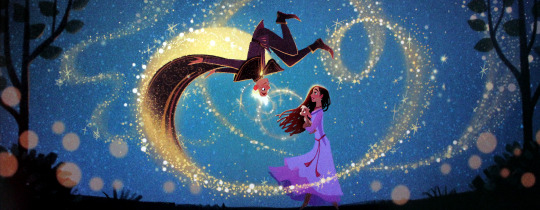
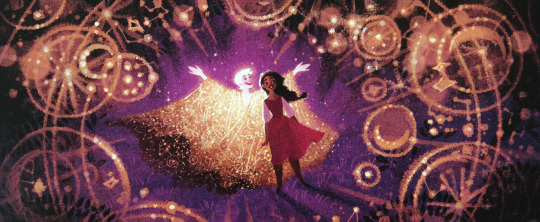
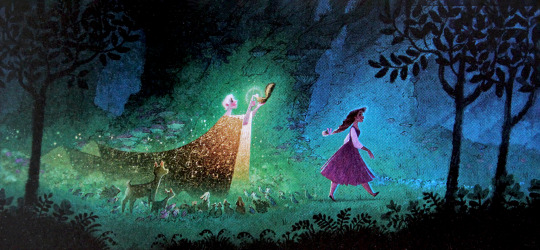
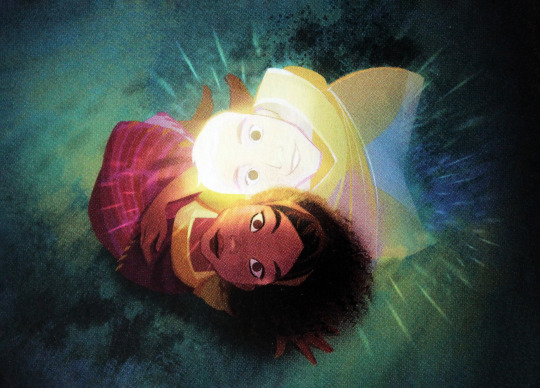
Early visual development for Wish (2023) by Griselda Sastrawinata-Lemay and Brittney Lee.
An earlier version of the film saw Star take on a human form as a magical, glowing character inspired by Peter Pan. Ultimately, the creative team reconceptualized Star as an ethereal, playful entity resembling Mickey Mouse. "Now Star and Asha have an emotional journey. They are soulmates." -Allison Moore.
#i would've loved to see star as a jack frost-ish character either as a love interest or platonic friend#they really had an original concept with the potential to be great if executed properly but chose to play it safe#disney#wish#my scans from the art of wish#do not repost#asha#star#visual development#disney concept art#concept art#art#artwork#illustration#disney animation#animation#disney wish#wish movie#wish 2023
15K notes
·
View notes
Text
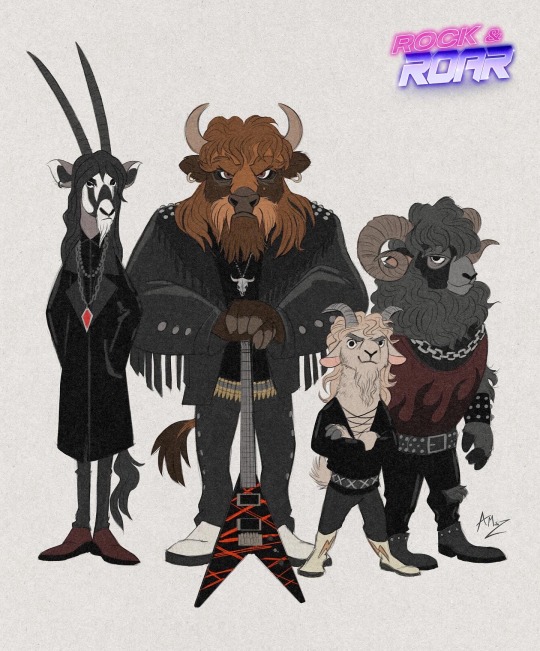
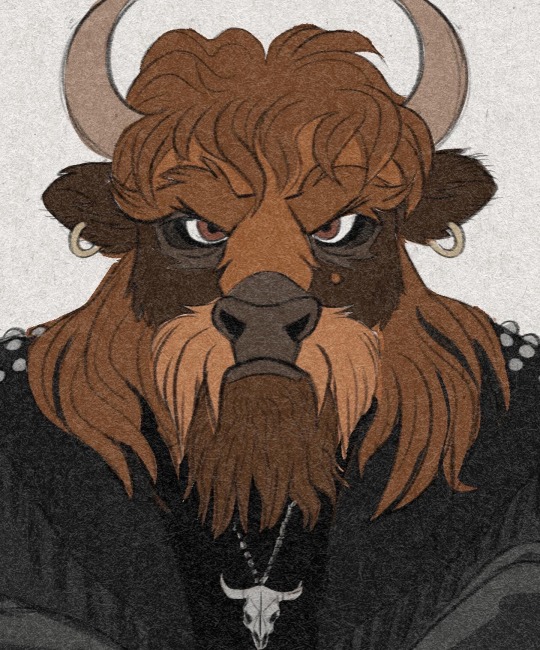
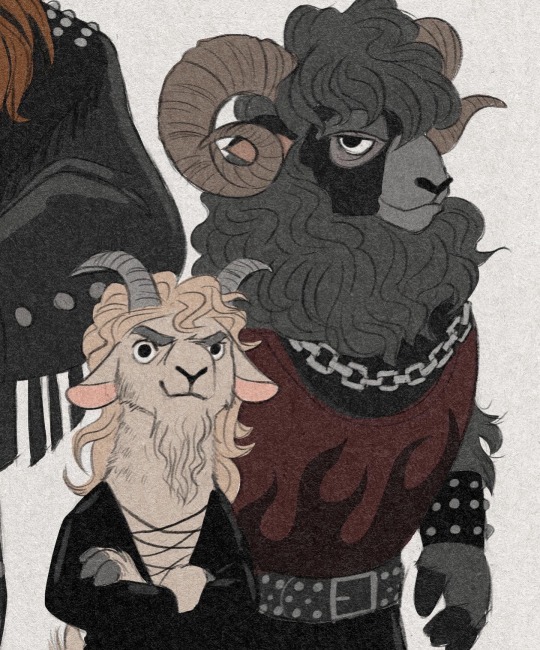
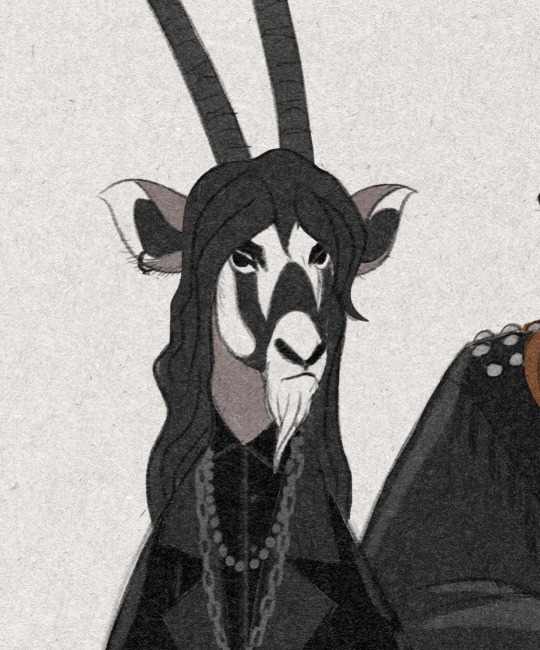
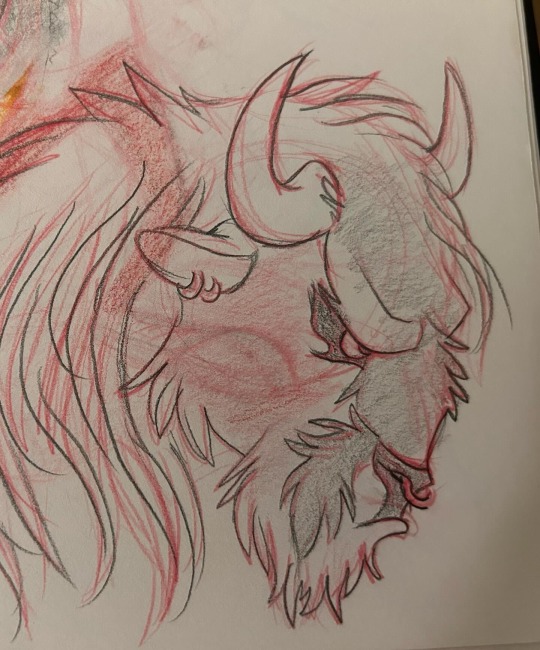
Outta the way! The kings of Metal are charging in! 🤘🏼Meet Steel Stampede, fronted by the legendary Grant Ruffalo. In the world of Rock & Roar, heavy metal music was originated by, and belongs to, animals with horns, and that’s the origin of the “🤘🏼” hand symbol. The last image is a drawing of Grant from all the way back in 2013. Miles will meet these guys in chapter 4!
#rock and roar#webcomic#concept art#visual development#original character#animal characters#webcomics#anthropomorphic#cartoon animation#anthro#metal#heavy metal#metalhead#metal heads#Buffalo#bison#oryx#antelope#goat#rams#sheep#ungulate#bovine#horns#my ocs#anthro oc#anthro artist#Steel Stampede#Grant Ruffalo
8K notes
·
View notes
Text
I'm rewatching Steven Universe and I will never forgive Fandom for what it did to her
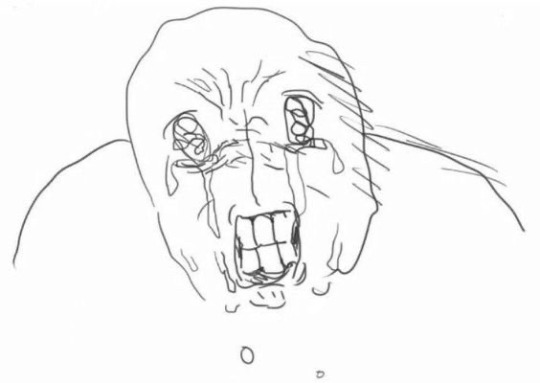
#also watching it at age 19-20 as it was released and experiencing the resulting clusterfuck online fandom response was a wild trip#im finally rewatching it again at 25 and really really feel lucky to have seen it at the age i did#i have completely different perspective on it now that i have 3 young nephews and a neice where before i was in college#the music is still as incredible as it was back then#and the animation#i cant beleive people got honestly and truly upset and violently aggressive about characters being off model sometimes#early stevens voice though kills me after awhile...... the yelling .... but his characters growth and development also being reflected in#his voice changing as he grows up#they also go crazy hard on some scenes#who am i kidding the show was a masterpiece and ahead of its time
13K notes
·
View notes
Text
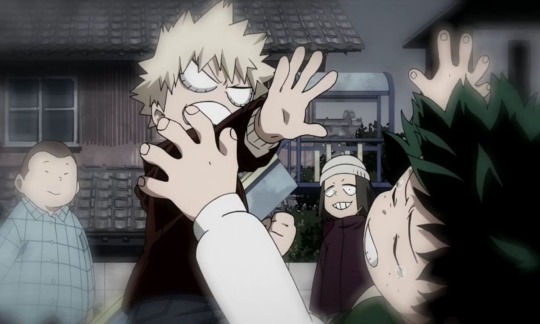
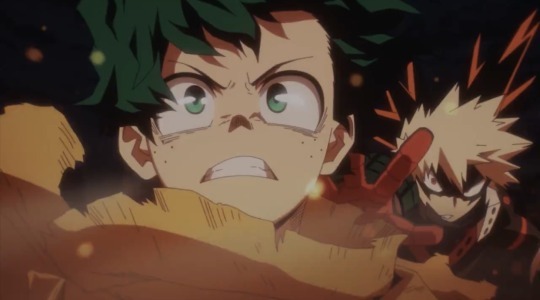
Katsuki pushes Izuku forward now instead of down 🥲
#hes come so far#this is character development#katsuki bakugou#izuku mydoria#bakudeku#bkdk#mha#bnha#my hero academia
5K notes
·
View notes
Note
what are some ways to describe people other than eye and hair color
I am assuming you are looking for physical descriptors. Here are some examples. I may just make a different post on psychological descriptors.
Arms: Long, Muscular, Pudgy, Short, Skinny, Thin
Back: Bent, Hunched, Ramrod Straight, Rounded
Build: Anorexic, Athletic, Beefy, Brawny, Burly, Chubby, Coltish, Compact, Fat, Gangly, Gaunt, Gawky, Haggard, Heavy-set, Herculean, Husky, Lanky, Lithe, Muscular, Obese, Overweight, Petite, Rangy, Reed-like, Scrawny, Skinny, Slender, Slight, Solid, Spindly, Statuesque, Stocky, Strapping, Sylphlike, Taut, Thickset, Thin, Trim, Underweight, Voluptuous, Well-built, Willowy, Withered
Cheeks: Blushing, Bold, Curved, Dimpled, Bold, Curved, Dimpled, Disturbed, Glorious, Glowing, Hairless, High (cheekbones), Hollow, Honey, Livid, Pale, Pallid, Pink, Plump, Puffy, Radiant, Reddened, Rosy, Rounded, Ruddy, Shining, Smooth, Soft, Sun-burnt, Sun-bronzed, Sunken, Sun-tanned, Tanned, Tearful, White
Chin: Angular, Bony, Bumpy, Chiseled, Defined, Doughy, Firm, Protruding, Round, Smooth, Soft, Square, Strong
Ears: Jug-like, Large, Protruding, Tiny
Eyebrows: Arching, Bushy, Emphasized, Near, Spaced, Thick, Thin
Eyelashes: Artificial, Beaded, Beautiful, Blinking, Dark, Dark-fringed, Dense, Dusky, Heavily-fringed, Long, Mascaraed, Sandy, Sooty, Sopping, Tear-drenched, Thick, Uplifted
Eyes: Almond-shaped, Bright, Bulging, Expressive, Frightened, Gentle, Languishing, Little, Luminous, Made-up, Round, Shining, Shortsighted, Smart, Stunned, Thin, Wide, Woeful
Face: Baby, Blood-stained, Bold, Chiseled, Contorted, Dead, Expressionless, Fair, Familiar, Fierce, Flat, Frightened, Furrowed, Honest, Indifferent, Little, Pale, Poker, Pretty, Radiant, Rough, Ruddy, Sallow, Square, Stained, Swollen, Trim, Weather-beaten, Wry
Feet: Athlete's, Big, Flat, Pigeon-toed, Small, Sore, Stinky, Stubby, Swollen
Fingers: Gnarled, Long, Short, Stubby
Finger Nails: Bitten, Broken, Claw-like, Dirty, Hooked, Long, Painted, Sharp, Talon-like
Hair: Afro, Bald, Beehive, Braided, Bristles, Bun, Chignon, Coiffure, Combed, Corkscrew, Corn rows, Cowlicked, Crew cut, Curly, Disarrayed, Disheveled, Dreadlocks, Dry, Flattop, Flecked, French braid, French twist, Fringe, Greasy, Grizzled, Knotted, Layered, Locks, Matted, Messed up, Mohawk, Mussy, Muttonchops, Neat, Oily, Page boy, Perm, Pigtails, Plait, Pompadour, Ponytail, Ragged, Receding, Ringlets, Ruffled, Shaggy, Shorn, Shoulder-length, Skinhead, Spiky, Split-ended, Straight, Tangled, Thick, Thinning, Tidy, Topknot, Tousled, Twisted, Uncombed, Unshorn, Untidy, Wavy, Wiry, Wisps
Hand: Big, Elegant, Small
Height: Big, Knee-high, Medium, Short, Shoulder-high, Sky-high, Small, Tall, Towering, Waist-high
Legs: Amputated, Bandy, Bony, Bowed, Brawny, Bulging, Fluted, Gartered, Gouty, Graceful, Hacked, Hairy, Jagged, Knotted, Leaden, Long, Lower, Muscular, Pitiful, Rickety, Shapely, Shivering, Short, Sinewy, Slender, Slim, Spindle, Stockinged, Sturdy, Thin, Thread-like, Tinder, Tiny, Toothsome, Tree trunks
Lips: Blue, Cracked, Cupid's Bow, Downturned, Dry, Fat, Full, Grim, Large, Luscious, Parched, Parted, Red, Ruby, Small, Smiling, Thin, Wet
Mouth: Arch, Ascetic, Baby, Cavernous, Churning, Compressed, Cooing, Coral, Cracked, Cruel, Delicate, Dumpled, Distended, Dry, Fine, Firm, Frothy, Full, Funnel-shaped, Gaping, Grim, Handsome, Hungry, Insistent, Irritable, Large, Luscious, Munching, Musty, Perilous, Puckered, Querulous, Relaxed, Resolute, Sardonic, Sensuous, Serious, Slobbering, Small, Sulky, Sweet, Tender, Thin, Wide, Winsome, Wrinkled, Yawning
Neck: Bullnecked, Elegant, Long, Short, Swan-like, Thick
Palm: Broad, Oval, Rectangular, Square
Skin: Acned, Alabaster, Albino, Apricot, Black, Blemished, Blistered, Blooming, Blotchy, Blushing, Bronzed, Cadaverous, Calloused, Caramel, Clear, Craggy, Cream, Ebony, Fair, Flush, Freckled, Glowing, Greasy, Ivory, Jaundiced, Leathery, Lily-white, Lined, Milky, Mottled, Nut-brown, Olive, Pale, Pallid, Pasty, Peeling, Pimpled, Pink, Pitted, Pockmarked, Red, Rosy, Rough, Ruddy, Russet, Sallow, Scabby, Scarred, Smooth, Splotchy, Spotty, Sun-burnt, Tan, Wan, Waxen, White, Wrinkled, Yellow
Stomach: Bulging, Distended, Empty, Firm, Flabby, Flat, Heroic, Hollow, Lean, Paunchy, Protruding, Unbounded
Teeth: Artificial, Black, Blunted, Buck, Canine, Chattering, Clenched, Clinched, Compressed, Crooked, Dagger-like, Dazzling, Decayed, Deciduous, Extracted, False teeth, Feeble, Ferocious, Filed, Flashing, Fluoridated, Foam-laced, Fractured, Gap-toothed, Gleaming, Glistening, Glittering, Gnashing, Goofy, Grinding, Hooked, Horrid, Ivory, Jagged, Lacquered, Large, Milky, Mottled, Neglected, Pearly, Perfect, Pretty, Protruding, Razor-like, Sharp, Shining, Short, Small, Snowy, Sore, Spaced, Straight, Sweet tooth, Tender, Tiny, Toothless, Toothy, Ugly, Unrelenting, White, Wisdom, Wolfish, Yellow
Hope this helps! If it does, do tag me or send me a link to your writing. I'd love to read your work.
More: On Character Development
#anonymous#character development#character building#langblr#writeblr#linguistics#words#writers on tumblr#spilled ink#dark academia#writing reference#literature#writing prompt#poetry#poets on tumblr#character inspiration#original character#character design#writing inspo#writing inspiration#writing ideas#fiction#writing resources
3K notes
·
View notes
Text
How To Make Your Writing Less Stiff 5
Movement
Dredging this back up from way back.
Make sure your characters move, but not too much during heavy dialogue scenes. E.g. two characters sitting and talking—do humans just stare at each other with their arms lifeless and bodies utterly motionless during conversation? No? Then neither should your characters. Make them…
Gesture
Wave
Frown
Laugh
Cross their legs/their arms
Shift around to get comfortable
Pound the table
Roll their eyes
Point
Shrug
Touch their face/their hair
Wring their hands
Pick at their nails
Yawn
Stretch
Sniff/sniffle
Tap their fingers/drum
Bounce their feet
Doodle
Fiddle with buttons or jewelry
Scratch an itch
Touch their weapons/gadgets/phones
Check the time
Get up and sit back down
Move from chair to tabletop
The list goes on.
Bonus points if these are tics that serve to develop your character, like a nervous fiddler, or if one moves a lot and the other doesn’t—what does that say about the both of them? This is where “show don’t tell” really comes into play.
As in, you could say “he’s nervous” or you could show, “He fidgets, constantly glancing at the clock as sweat beads at his temples.”
This site is full of discourse on telling vs showing so I’ll leave it at that.
Epithets
In the Sci-fi WIP that shall never see the light of day, I had a flashback arc for one male character and his relationship with another male character. On top of that, the flashback character was a nameless narrator for Reasons.
Enter the problem: How would you keep track of two male characters, one who you can't name, and the other who does have a name, but you can’t oversaturate the narrative with it? I did a few things.
Nameless Narrator (written in 3rd person limited POV) was the only narrator for the flashback arc. I never switched to the boyfriend’s POV.
Boyfriend had only a couple epithets that could only apply to him, and halfway through their relationship, NN went from describing him as “the other prisoner” to “his cellmate” to “his partner” (which was also a double entendre). NN also switched from using BF’s full name to a nickname both in narration and dialogue.
BF had a title for NN that he used exclusively in dialogue, since BF couldn’t use his given name and NN hadn’t picked a new one for himself.
Every time the subject of the narrative switched, I started a new paragraph so “he” never described either character ambiguously mid-paragraph.
Is this an extreme example? Absolutely, but I pulled it off according to my betas.
The point of all this is this: Epithets shouldn’t just exist to substitute an overused name. Epithets de-personalize the subject if you use them incorrectly. If your narrator is thinking of their lover and describing that person without their name, then the trait they pick to focus on should be something equally important to them. In contrast, if you want to drive home how little a narrator thinks of somebody, using depersonalizing epithets helps sell that disrespect.
Fanfic tends to be the most egregious with soulless epithets like "the black-haired boy" that tell the reader absolutely nothing about how the narrator feels about that black-haired boy, espeically if they're doing so during a highly-emotional moment.
As in, NN and BF had one implied sex scene. Had I said “the other prisoner” that would have completely ruined the mood. He’s so much more than “the other prisoner” at that point in the story. “His partner,” since they were both a combat team and romantically involved, encompassed their entire relationship.
The epithet also changed depending on what mood or how hopeless NN saw their situation. He’d wax and wane over how close he believed them to be for Reasons. NN was a very reserved character who kept BF at a distance, afraid to go “all in” because he knew there was a high chance of BF not surviving this campaign. So NN never used “his lover”.
All to say, epithets carried the subtext of that flashback arc, when I had a character who would not talk about his feelings. I could show you the progression of their relationship through how the epithets changed.
I could show you whenever NN was being a big fat liar about his feelings when he said he's not in love, but his narration gave him away. I could show you the exact moment their relationship shifted from comrades to something more when NN switched mid-paragraph from "his cellmate" to "his partner" and when he took up BF's nickame exclusively in the same scene.
I do the same thing in Eternal Night when Elias, my protagonist, stops referring to Dorian as "it" and "the vampire" instead of his name the moment they collide with a much more dangerous vampire, so jarringly that Elias notices in his own narration—the point of it being so explicit is that this degredation isn't automatic, it's something he has to conciously do, when everyone else in his clan wouldn't think twice about dehumanizing them.
—
Any literary device should be used with intent if you want those layers in your work. The curtains are rarely just blue. Whether it’s a simile with a deliberate comparison or an epithet with deliberate connotations, your readers will pick up on the subtext, I promise.
#writing#writing advice#writing a book#writing resources#writeblr#writing tips#writing tools#literary devices#character description#character development
3K notes
·
View notes
Text
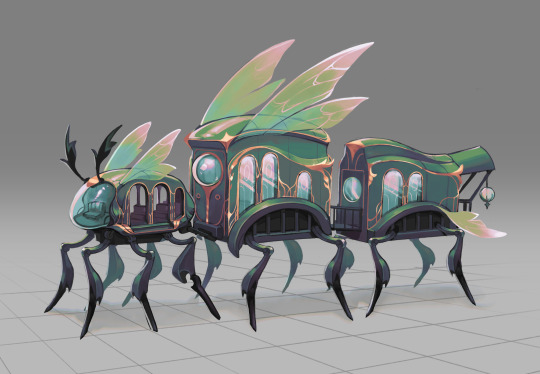
bug bus bug bus bug bus!!!
#concept art#world development#vehicle design#fantasy art#art nouveau#zero art#piece for a visdev class! rare chance to do something other than characters
6K notes
·
View notes
Text
Body language cues for a few emotions
Happiness:
Smiling genuinely, with crinkles around the eyes.
Open body posture, with relaxed arms and shoulders.
Leaning forward slightly towards the person or object of interest.
Making eye contact with a warm and engaged expression.
Anger:
Tightened jaw and clenched fists.
Furrowed brows and narrowed eyes.
Standing or sitting with a rigid and tense posture.
Pointing fingers or aggressive gestures.
Raised voice or speaking through gritted teeth.
Sadness:
Downcast eyes and a drooping posture.
Slumped shoulders and shallow breathing.
Avoiding eye contact and withdrawing from social interaction.
Sighing or a subdued tone of voice.
Tearfulness, with watery or red eyes.
Fear:
Widened eyes with dilated pupils.
Raised eyebrows and a tense facial expression.
Frozen or rigid body posture.
Backing away or seeking physical distance from the perceived threat.
Trembling or shaking, especially in the hands or legs.
Surprise:
Raised eyebrows and widened eyes.
Mouth slightly agape or forming an "O" shape.
Leaning forward or recoiling backward in response to the surprise.
Quick inhalation or gasp of breath.
Rapid blinking or blinking more than usual.
Disgust:
Curling the upper lip or wrinkling the nose.
Narrowing the eyes and raising the upper eyelids.
Turning the head away or physically distancing oneself from the source of disgust.
Covering the mouth or nose with the hand or a tissue.
Expressing verbal disgust through phrases like "ew" or "yuck."
These are just some examples, and individuals may display variations in their body language based on their personality, cultural background, and the specific context of the situation.
#writing#writer on tumblr#writerscommunity#writing tips#character development#creative writing#body language#writing characters#writers on tumblr#authors of tumblr
11K notes
·
View notes